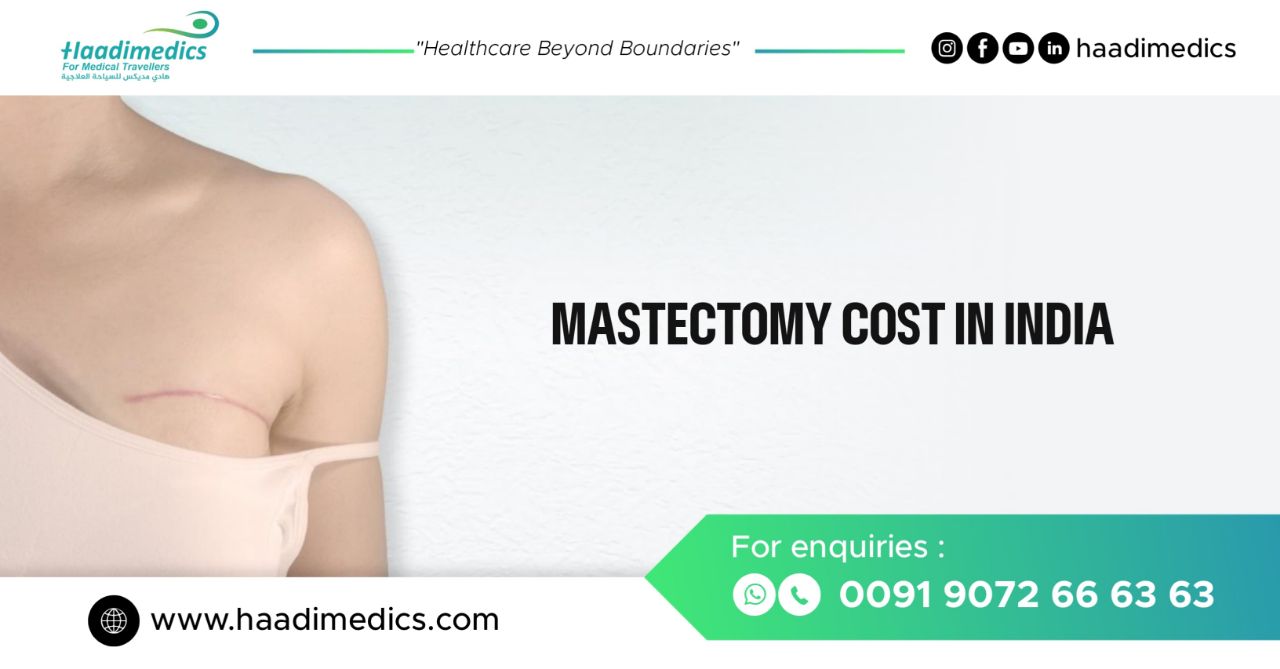India has made significant advancement and success in oncological surgeries, including mastectomy, can be attributed to its advanced medical infrastructure, skilled surgeons, and dedication to patient care. Renowned hospitals across the country specialize in cancer treatment, offering state-of-the-art facilities and personalized treatment plans. With a focus on affordability and accessibility, India has become a global hub for cancer care, attracting patients from around the world.
What is Mastectomy?
Mastectomy is a surgical procedure aimed at removing one or both breasts to treat or prevent breast cancer. It is performed when cancer is present, or as a preventive measure for individuals at high risk of developing breast cancer. Mastectomy may involve the removal of the entire breast tissue, including the nipple and areola (total mastectomy), or just the breast tissue while preserving the skin over the breast (skin-sparing mastectomy).
Why is it done?
Mastectomy is performed for various reasons, including:
Treatment of breast cancer: Mastectomy is often recommended when cancer is detected in one or both breasts and cannot be effectively treated with less invasive options.
Risk reduction: Women with a high risk of developing breast cancer, such as those with a strong family history or genetic mutations (e.g., BRCA1 or BRCA2), may choose to undergo prophylactic mastectomy to reduce their risk of developing the disease.
Risks
Infection
Bleeding
Seroma (fluid accumulation)
Nerve damage
Lymphedema (swelling due to lymph node removal)
Changes in breast sensation or appearance
Psychological impact
Preparation
Preparation for mastectomy involves a comprehensive pre-operative evaluation and discussions with the surgical team. Patients may undergo imaging tests and blood tests to assess their overall health and ensure optimal surgical planning. Pre-operative counseling may address expectations, potential risks, and post-operative care instructions.
Procedures
During a mastectomy, the patient is placed under general anesthesia to ensure comfort and safety. The surgeon makes an incision in the breast tissue and carefully removes the breast tissue and, if necessary, lymph nodes in the armpit (axillary lymph node dissection). The type of mastectomy performed depends on factors such as the extent of cancer, breast size, and patient preference.
Best Hospitals in India
- Apollo Hospitals, Chennai
- Max Hospital, New Delhi
- Fortis Hospital, Mumbai
- Wockhardt Hospital, Mumbai
- Artemis, Gurgaon
- AIIMS, Delhi
- KIMS Hospital, Hyderabad
Best Doctors for the Surgery
- Dr. Mandeep Singh Malhotra
- Dr. Arun Prasad
- Dr. (Prof.) K.N. Srivastava
- Dr. Amit Deepta Goswami
- Dr Jameel J K A
- Dr Neha Shah
- Dr. Deep Goel
Top Nations in this Field
While India excels in providing affordable and high-quality mastectomy surgeries, other countries such as the United States, the United Kingdom, Germany, South Korea and Australia also have renowned breast cancer centers and oncologists. These nations offer advanced technologies, innovative treatment approaches, and comprehensive support services for patients with breast cancer.
Cost Comparison
India – USD 1500
Thailand – USD 5000
Turkey – USD 7000
Germany – USD 9000
USA – USD 15000
FAQ
1. Is mastectomy the only treatment option for breast cancer?
No, mastectomy is one of several treatment options for breast cancer. The choice of treatment depends on factors such as the stage of cancer, tumor characteristics, and patient preference.
2. Will I need breast reconstruction surgery after mastectomy?
Women who want to restore the appearance of their breasts following a mastectomy have the option of breast reconstruction. It can be performed immediately after mastectomy or at a later time.
3. How long does it take to recover from mastectomy surgery?
Recovery time varies for each individual but typically ranges from a few weeks to several months. It's important to follow post-operative care instructions provided by your surgeon for optimal healing.
4. What are the potential risks associated with mastectomy surgery?
Risks include infection, bleeding, changes in breast sensation or appearance, seroma (fluid accumulation), and lymphedema (swelling due to lymph node removal).
5. Will I need additional treatments such as chemotherapy or radiation therapy after mastectomy?
The need for additional treatments depends on factors such as the stage and characteristics of the cancer. Your oncologist will recommend the appropriate treatment plan based on your individual case.
6. Can mastectomy surgery affect my ability to breastfeed in the future?
Mastectomy involves the removal of breast tissue, which may impact your ability to breastfeed. If you have concerns about breastfeeding in the future, discuss them with your healthcare provider.
7. How can I prepare for mastectomy surgery?
Preparation may involve discussions with your healthcare team, pre-operative evaluations, and following any pre-operative instructions provided. It's essential to ask questions and address any concerns you may have before surgery.
8. What can I expect during the recovery period after mastectomy surgery?
During recovery, you may experience discomfort, swelling, and drainage at the surgical site. Your surgeon may prescribe pain medication and recommend activities to promote healing.
9. Will I need to stay in the hospital after mastectomy surgery?
The length of hospital stay varies depending on factors such as the extent of surgery and your overall health. Some mastectomy procedures may be performed on an outpatient basis, while others may require a hospital stay.
10. How soon can I resume normal activities after mastectomy surgery?
The timeline for resuming normal activities varies for each person. Your surgeon will provide guidance on when it's safe to return to activities such as work, exercise, and lifting heavy objects. It's essential to follow your surgeon's recommendations for a smooth recovery process.


Comments